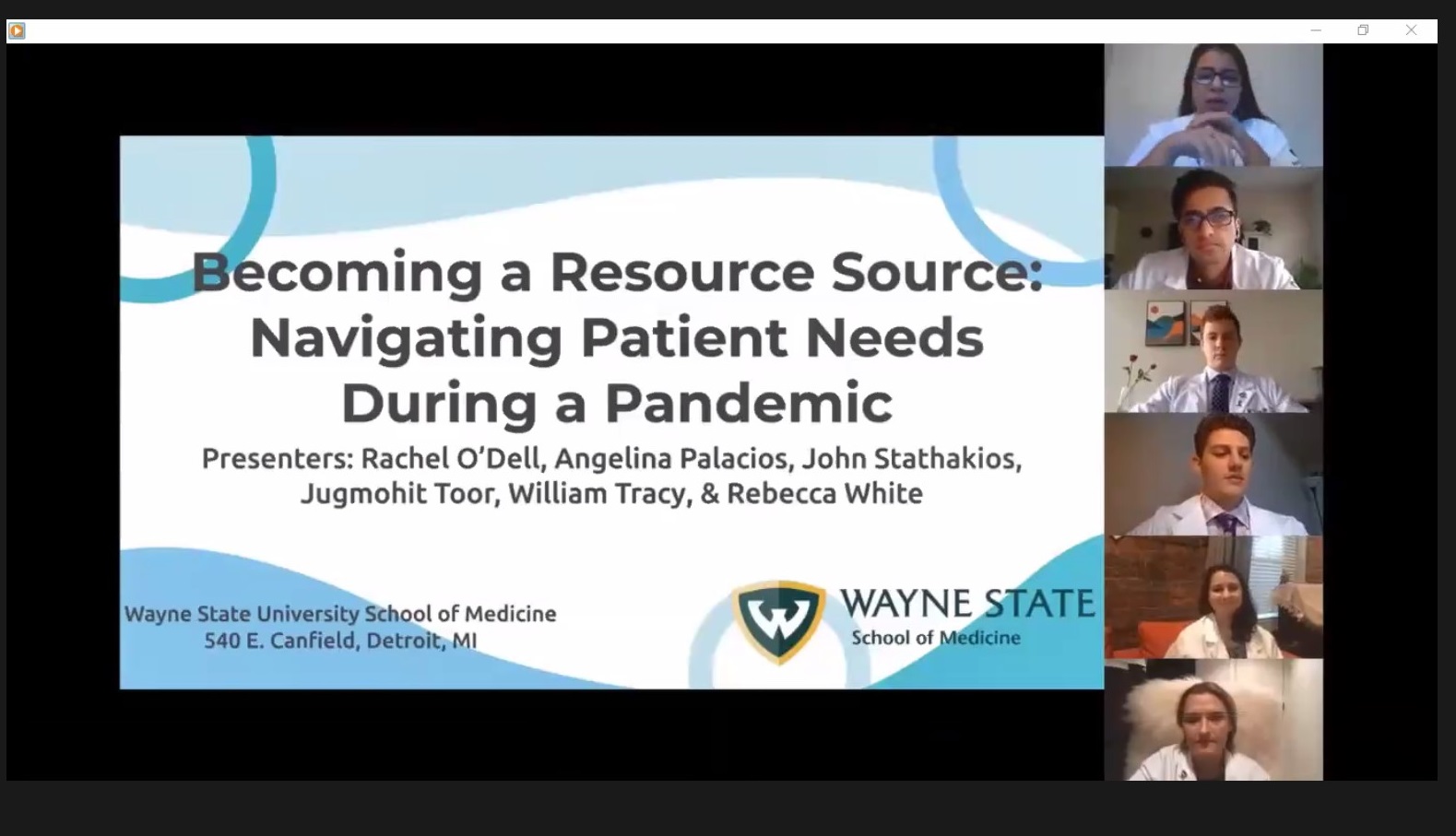
Wayne State University School of Medicine students continue to impress the academic-minded in the virtual world, with recent presentations illustrating leadership and innovation.
The Generalists in Medical Education national conference held Nov. 11-13 showcased two presentations Nov. 12 that made the School of Medicine’s Director of Community Engagement Jennifer Mendez, Ph.D., very proud, she said.
The topic of the meeting was “Moving Forward with a Vision for Medical Education: What’s Working, What’s Next, and What’s Needed.”
As part of a roundtable session designed to share experiences and ideas on special topics, “Perceived Benefit of a Student-Run Journal Club: Successes and Considerations of Coffee Talks” was presented by students Aisha Kazeem, Caroline Caldart, Hannah Shuman and Ryan Melikian. Leaders briefly introduced their topics and then facilitated discussion among participants.
The WSU School of Medicine chapter of the American Medical Women’s Association holds the monthly journal clubs, dubbed “Coffee Talks,” to read and discuss articles on topics related to gender and health inequity. The intent of the Coffee Talks is to provide a forum for the open exchange of ideas and sharing of experiences between School of Medicine students and medical professionals from Women in Medicine and Science. Additionally, the Coffee Talks provide an avenue of communication about topics not traditionally covered in medical school curricula. Recently discussed topics include burnout among female physicians, medical student mistreatment, minority residents’ perspective on the role of race in their training, and the reproductive rights of Black women in the United States.
“As medical students, we observed gaps in our pre-clinical curriculum and used that opportunity to facilitate monthly journal clubs to explore topics that merited deeper discussion. The Coffee Talks are an opportunity for peer education and a potential model for future curriculum adjustments,” the team said.
The students are advised by Professor of Internal Medicine Diane Levine, M.D., with support from Dr. Mendez.
Later in the day, Class of 2023 student Rachel O’Dell led the talk, “Becoming a Resource Source: Navigating Patient Needs During a Pandemic,” with support from classmates Angelina Palacios, Rebecca White, Jugmohit Toor, John Stathakios and William Tracy, and mentor Dr. Mendez.
Dr. Mendez and Assistant Professor of Internal Medicine LaTonya Riddle Jones, M.D., co-direct the Service Learning portion of the M.D. curriculum’s Patient, Population, Physician and Professionalism course.
“When the pandemic hit, we could not offer in-person volunteering for Service Learning, so I matched the Year Two students by learning communities to families affiliated with the nonprofit Brilliant Detroit,” Dr. Mendez said. “This learning community submitted their experience and the resource guide they developed to the conference to share how students can still assist their patients online.”
The presentation was included in the Ignite session, in which presenters had five minutes to report a thought-provoking idea or story that might merit further exploration to the audience.
“Through our coursework, we collaborated to develop a resource guide that had specifically met the community needs for a patient during the times of a pandemic. We aimed to develop a guide that would be easily accessible for a patient with limited access to resources that is not only obtainable during the restrictions of pandemic but applicable to general practice as well,” O’Dell wrote in her initial submission to conference organizers.
Patients in the community volunteered to be contacted by students regarding their physical and social health needs during the COVID-19 pandemic. Six students established contact via Zoom and conducted a full medical and social history with patients. Using the patient note, students compiled city- and statewide resources from government websites and local and state newspapers, with special attention to the needs of patients.
The patients were contacted again and sent the list of resources, along with explanations on how to use it as well as how to stay safe during the COVID-19 pandemic